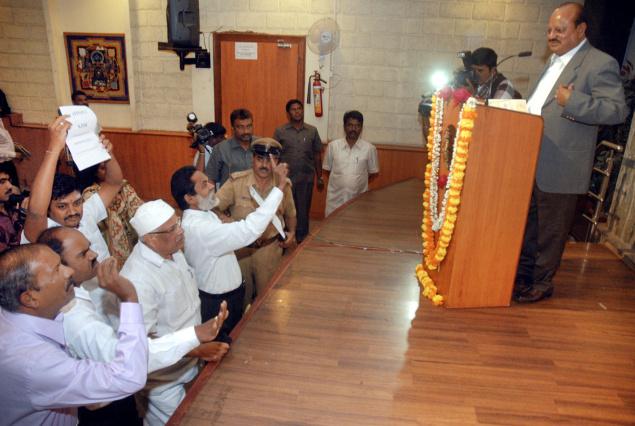Bangalore, December 12: The Karnataka State Human Rights Commission (KSHRC) will have a new chairperson on December 17, Law and Parliamentary Affairs Minister T.B. Jayachandra has said.
He announced this here on Tuesday after a group of human rights and Right to Information activists staged a protest against the post lying vacant for long (nearly 18 months), as the Minister got up to speak at a function to mark Human Rights Day.
The Minister said that the name of the person to head the commission will be decided at a meeting on December 17, to be attended by Chief Minister Siddaramaiah, the Chairman of the Legislative Council and Leaders of the Opposition. The person to be selected will be one among the three names proposed for the post. “It will then be sent to the Governor,” Mr. Jayachandra said and added that the process might take around 15 days to be completed. He had proposed providing additional infrastructure and staff to ensure that the pending cases could be disposed of speedily, the Minister said. As many as 42,611 cases were received by the commission between July 2007 and the end of October 2013. As on November 1, 15,184 cases are pending before the commission.
Pleading helplessness on the post lying vacant, Mr. Jayachandra said that five people whose names were proposed for the post earlier had turned down the offer. The posts of members had been filled but not that of the commission chief.
‘Give importance’
Earlier, the former Chief Justice of India S. Rajendra Babu underlined the need to give proper importance to the human rights commissions in the States so that people could repose trust in them. “Practically, every State commission has a problem,” he said.
He said that the idea of protecting human rights had failed despite several legislations.
On the Right to Education Act, Mr. Rajendra Babu asked how the legislation could be meaningfully implemented in the absence of an equitable education system. “In this country, we have different kinds of education for different classes of people and there are rural pockets with no schools at all,” he said.

